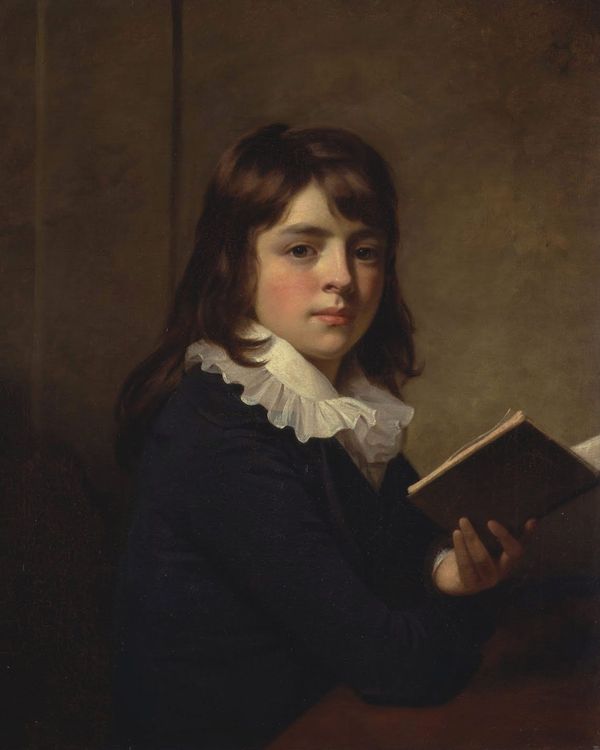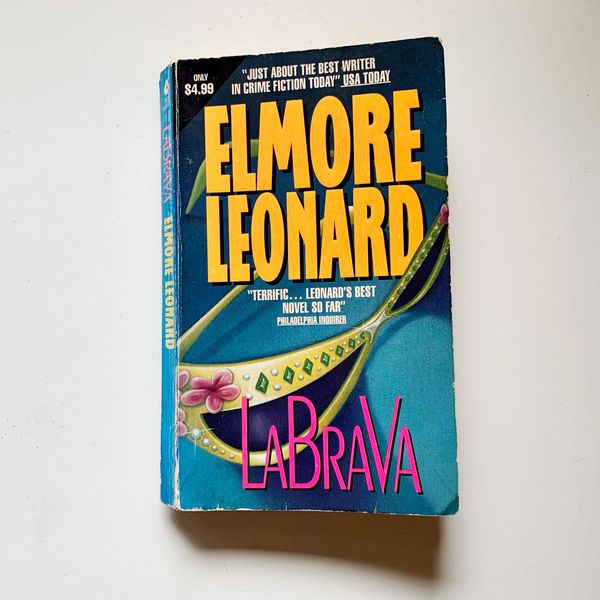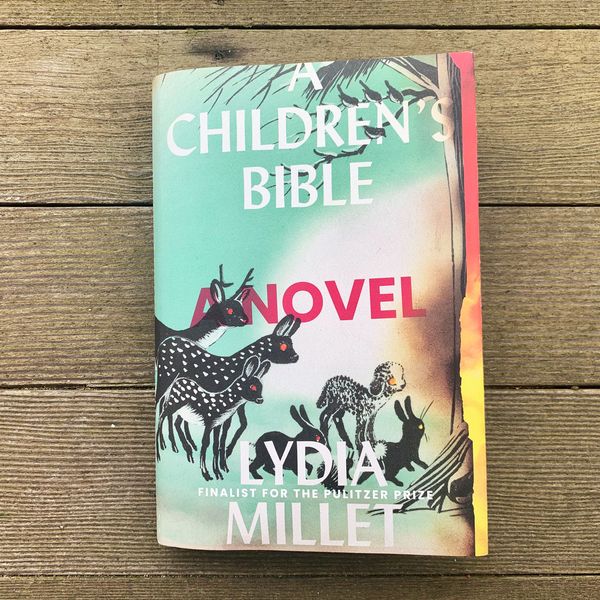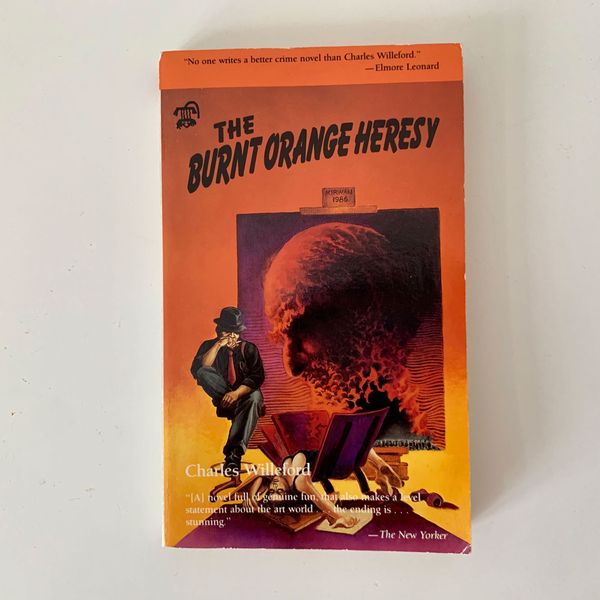
Call me a fascist, but I love statements that start with, “There are two types of people …” Someone once told me, “There are two types of people: those who run out of toilet paper and those who never do.” (These days: not much of a choice.) Another person hit me with, “There are two types of people: people who lose things and people who break things.” Here’s a third that I’ve personally observed to be true: There is one kind of person who, when she is in a sad mood, will listen to sad music as a way of ratifying her emotion, while others will listen to happy music for its counteractive qualities.
There are books here for both types of sad people. If you want verification of your gloom — assuming, and I do, that you’re gloomy — consider A Children’s Bible. If you want escapism, consider all the rest. I am here to serve.
LaBrava by Elmore Leonard
Fiction, 1983
The local library is closed, of course, but it’s got a no-contact book sale going on that works like this: There’s a shelf of books that vary extravagantly in quality and condition. You approach the shelf, browse, select your books, pick a few more because who knows how long you’ll be indoors, and shove your total (25 cents per title) into the book-return slot. This isn’t a COVID-19–specific innovation; the system has been in place for at least a decade. Perhaps your local library runs a similar operation. At any rate, I zeroed in on this Elmore Leonard book but didn’t have money with me, so I decided to walk home, fetch a coin, and return. On my way, it started raining. Long story short, I didn’t return to the library for three days—until the guilt over owing a quarter overwhelmed my reluctance to get rained on. Happily, the book was well worth 72 hours of trivial turmoil. It’s a louche Miami tale of a fallen movie star whose life begins to imitate the plots of her noir films — complete with scams, goons, seduction, treachery, and sunglasses. If you want to submerse yourself in a masterful mystery with atmosphere for days, Leonard is your doctor and LaBrava your medicine.
RIYL: David Mamet movies, suntan oil, suspecting foul play, hoaxes, a well-timed saxophone solo in a pop song, motel blankets (the flammable kind)
A Children’s Bible by Lydia Millet
Fiction, May 12
If either of the words in this book’s title turn you off, as they did me (I mean, only mildly), simply flip to the author photo of Millet. She is depicted mid-sentence, as though yelling “Hey!” at the reader. Who could resist? Now that you’re in, you’ll be glad to know we have a prime example of that rare and precious thing: a funny dystopia. A group of wealthy parents rent a robber baron’s mansion for the summer. They spend their time drinking and idling and contributing to society’s decline while their collective children roam in feral splendor. The kids hate the adults with an untrammeled and creatively expressed vengeance. When a hurricane hits, they escape their summer enclosure. This is not a normal hurricane but one endowed with fearsome powers by climate change. Cell service goes down, roads wash out, shops are looted, markets crash, gas stations run dry, diseases proliferate, violence erupts. The price of tampons skyrockets to $40 per box. It doesn’t precisely echo our moment, but there are recognizable events and possibilities. Sometimes it feels good to have your anxieties reflected back at you in an artful format. Now is one of those times.
RIYL: A Visit from the Goon Squad, Lydia Davis, using novels as a template for living, cautious optimism, The Martian (Matt Damon movie)
The Burnt Orange Heresy by Charles Willeford
Fiction, 1971
You can’t judge a book by its blurbs, but let’s nonetheless take a look at these two printed on the back cover of The Burnt Orange Heresy:
“You will enjoy it [even if] you have never bought anything more original than a van Gogh print.” —New York Times
“Nabokov would smile and approve.” —Nashville Tennessean
How could any novel possibly be the hypotenuse of those two statements? The first is calling me a philistine and the other is guaranteeing a beyond-the-grave stamp of approval from Nabokov. I had no choice but to complete the triangulation by reading it. It marks the first—and I hope last—time I’ve been negged into starting a book. The narrator is a sociopathic art critic who hunts down an elusive painter in deep Florida and does unspeakable things. I suppose the idea of a “sociopathic art critic” is pretty Nabokovian. And the Times reviewer was correct in claiming “even” a person uninterested in art could get excited about this book. Here’s a sample sentence: “In the black swamp beyond the house a lonesome bull alligator roared erotically.” If that’s not enough to ignite your appetite, I don’t know what would.
RIYL: Thomas McGuane, the Gene Hackman film Night Moves, invading people’s privacy, Roald Dahl
WHY DON’T YOU …
Give yourself the CREEPS, with some help from Shirley Jackson?
Experience catharsis the old-fashioned way, with Shakespeare? Macbeth did it for me. Something I discovered while rereading it is that HAUTBOYS doesn’t mean what you hope it means.
Frolic amongst the CHINTZ FURNISHINGS and knotty mind of Iris Murdoch beginning with UNDER THE NET?
Try a novel that replicates the feeling GOING TO BED AT 8 P.M. because you can no longer bear the burden of consciousness — simultaneously dark and relaxing?
Dip into a suspenseful tale about the SEEDY UNDERBELLY of Tokyo?
Read the 1980s surf thriller that Point Break, the KLASSIC KEANU movie, was inspired by?
SUGGESTED PAIRING
Like Tiger King? I’ll see your Joe Exotic and raise you an even stranger and more sinister character in Ian McEwan’s Nutshell.
Every editorial product is independently selected. If you buy something through our links, New York may earn an affiliate commission.
*A version of this article appears in the April 27, 2020, issue of New York Magazine. Subscribe Now!
More From This Series
- Matrix and 9 Other Reads I Can’t Get Out of My Head
- The Listening House and 9 Other Reads I Can’t Get Out of My Head
- The Plot and 8 Other Reads I Can’t Get Out of My Head





